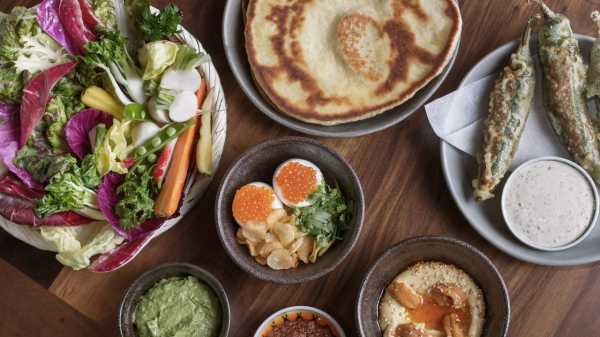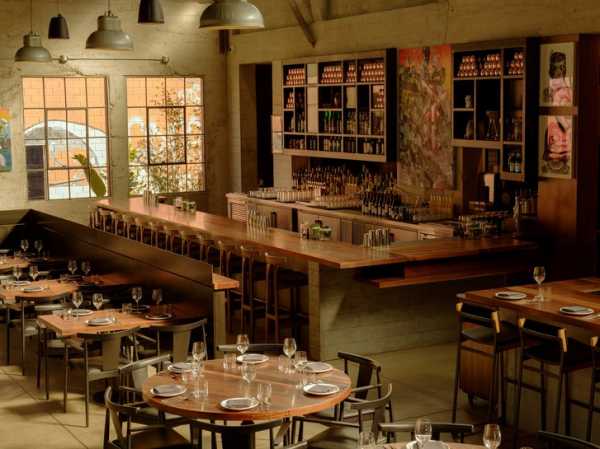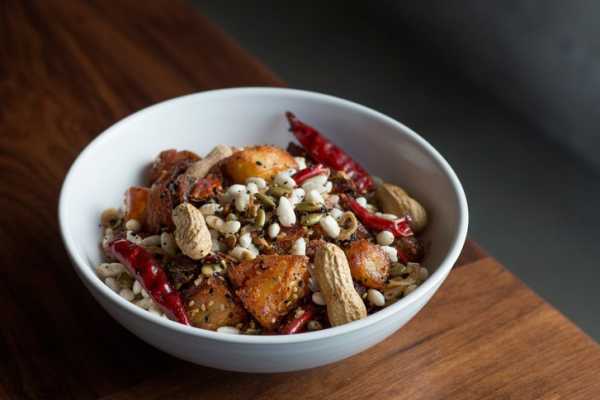
In an episode of his Netflix show, “Ugly Delicious,” the Korean-American chef David Chang goes head to head in a mock debate with the Italian-American chef Mario Carbone, of the restaurant empire Major Food Group. The issue in question: Asian dumplings vs. Italian stuffed pastas. “Of all the cultures in America that I feel is underrepresented in its importance is probably Asian culture,” Chang says. “I’m angry at the fact that Italy is so overrated in its food, and that all of Asian cuisine doesn’t get the representation that it deserves.” Later, as he watches Massimo Bottura make pasta, Chang exclaims, only half-jokingly, “This is wontons! It’s a mini Chinese dumpling! It’s not tortellini.” In another episode, he insists that a shrimp taco he tries in L.A. tastes Chinese, not Mexican—specifically like har gow, a popular Cantonese dim-sum dumpling. “Given time, food cultures will merge into one,” he says.
In the almost fifteen years since Chang opened his first restaurant, the trailblazing East Village ramen shop Momofuku Noodle Bar, he has done a great deal to enhance the representation of Asian food in America. He opened other Momofukus in New York and across the world, he wrote a Momofuku cookbook, and he started the beloved, and now defunct, magazine Lucky Peach. In addition to the Netflix show, Chang recently added a podcast to his roster, and announced that he was starting an entire media company. He has even débuted a line of condiments—several varieties of Korean chili sauce—in conjunction with Heinz. Chang’s style—his refusal to adhere to the barriers that have traditionally stood between Asian food and fine dining; his blurring of the distinction between casual and formal; his I-do-what-I-want creativity, cool factor, and celebrity—has played an immeasurable role in the wide-ranging popularization of things like steamed pork buns, ramen, miso, and sriracha. He’s the reason that making a bo ssäm—a Korean-style dry-brined, slow-roasted pork shoulder, marbled with glistening rendered fat, encrusted with caramelized brown sugar, and served with lettuce cups, rice, chili sauce, and kimchi—has become a dinner-party rite of passage for ambitious home chefs, and why so many restaurants now offer “large format” dishes, to be shared by a group.
One American city where Asian food has struggled less for representation is Los Angeles, the site of Majordomo, Chang’s newest restaurant, and his first on the West Coast. After Hawaii, California has the highest percentage of Asian-Americans and Pacific Islanders of any state, and its largest city is home to a veritable galaxy of Asian restaurants. Los Angeles boasts not only a Chinatown and a Koreatown but also a Thai Town, a Filipinotown, a Little Tokyo, and a Little Bangladesh, not to mention suburbs dense with destination Szechuan palaces and Cantonese seafood halls. Accordingly, Majordomo—which sits on the northern edge of Chinatown, in a huge, blocky building with valet parking and the scent of fish sauce pumping out of the exhaust system—pays tribute to L.A.’s iconic Asian dishes. Cumin- and Szechuan-peppercorn-spiked shredded lamb, for instance, is an homage to the toothpick lamb (small slices of meat speared with toothpicks before being stir-fried) served at Chengdu Taste and Sichuan Impression, in nearby Alhambra. The sweet, full-bodied, almost chocolatey Korean short ribs—braised, in the traditional way, with Asian pear and daikon—are served tableside, with dramatically gooey shavings from a block of hot raclette, inspired by a restaurant in Koreatown that tops its ribs with mozzarella.

Majordomo’s menu is dense and ever-changing, subject to David Chang’s whims.
Photograph by Molly Matalon / Momofuku
But the short ribs are also inspired by the raclette itself, which in its native Switzerland is sometimes poured over meat. Part of what made Chang famous is his genius for breaking rules, for letting his instincts, instead of tradition, and his breadth of knowledge and experience guide him. He is known for irreverently pulling together flavors, ingredients, and techniques from across cultures as he sees fit. (My colleague Helen Rosner has written about “Ugly Delicious” as an argument against the notion of culinary “authenticity.”) Eating at Majordomo, whose name means head of house, is like taking a walk through Chang’s brain; he isn’t fusing cultures so much as Venn-diagramming, showing where they already overlap in ways that the average American diner may never have noticed. Instead of “You should eat more Asian food,” the message is “You’ve been eating Asian food all along.” (Do you know where ketchup comes from?)
At Majordomo, Chang has ample space to show off: the open kitchen is so vast that staff members relay messages to one another via a gooseneck microphone behind the bar, as at a fast-food place or a high-volume diner. The menu is dense and ever-changing, subject to Chang’s whims. (Reservations are nearly impossible to get, but with a little persistence I got lucky walking in, twice.) When I went in March, I ate long green peppers, stuffed with just-cooked ground pork sausage, fried until tender in rice-flour batter, and served with a black-garlic buttermilk ranch—a supremely satisfying snack that might sound like a hybrid of dumplings and jalapeño poppers but is, in fact, a Korean classic called gochu jeon. Chang’s bing, a Chinese pancake, resembles a fluffy Sunday-morning flapjack and is about as sweet, if denser and breadier, with a gently cratered surface. A plate of noodles looked like something you’d find at a high-end Italian restaurant, coiled neatly on a plate into a sort of long tube, but they were made of tapioca, at once al dente and soft, and tangled with Chinese broccoli, almost-raw garlic, and tiny dried shrimp, a riff on an old Cantonese dish made with goose fat and shrimp roe. A wonderful salad featured tomatoes and soft, creamy fresh tofu, a pairing that makes exactly as much sense as tomatoes and mozzarella. Even the Bounty Bowl, a platter of haute crudité with dips—which seemed at first like a concession to the health-and-wellness nuts that give L.A. a bad rap—made its case. It was not unlike the assortment of raw vegetables that comes with certain spicy Thai dishes, and the obligatory green-goddess dressing paled in comparison with the jammy chili paste, as addictive as sriracha.

The fried butterball potatoes are tossed with sesame and poppy seeds, fried shallots, puffy rice, pepitas, dried chilis, and whole peanuts.
Photograph by Andrew Bezek / Momofuku
My favorite dish was the fried butterball potatoes: crisp golden cubes that somehow melted on the tongue, tossed with sesame and poppy seeds, fried shallots, puffy rice, pepitas, dried chilis, and peanuts in the shell. Sweet, salty, spicy, and tart, the concoction reminded me a little of South Asian chaat, a little of breakfast cereal, but mostly of something else Chang said on “Ugly Delicious,” in a conversation with Roy Choi, the Korean-American chef who started Kogi BBQ, L.A.’s popular Korean-taco truck. “It doesn’t taste Korean or Mexican,” Chang said. “It just tastes good.”
Sourse: newyorker.com






